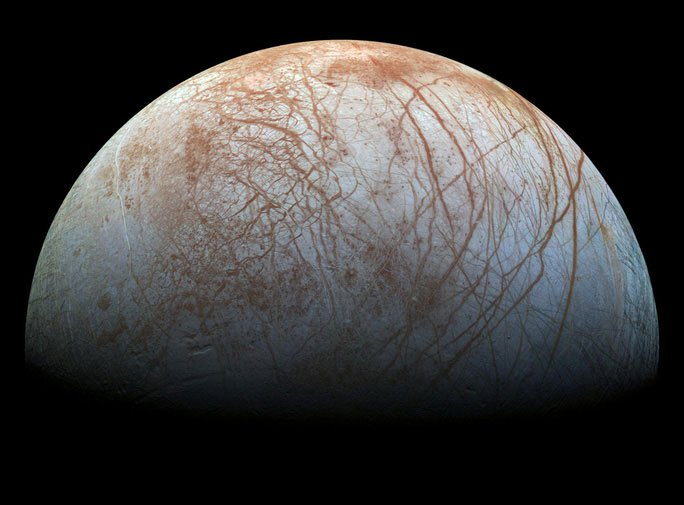The 'cold copy' of the Earth has ... octopus life form?
A planetary scientist said that beneath the sea ice of Europa, the moon of Jupiter's life may be octopus-like creatures.
A new analysis by Professor Monica Grady, majoring in Planetary and Space Sciences, Livepool Hope University (UK), suggests that if Mars had life, it was likely a bacterium; but on a further celestial body - Europa - it must be an intelligent lifeform similar to the most "elite" members of the earth's marine fauna, such as the octopus .
According to her, the place where these creatures reside is the icy sea below the surface of Europa, which has been indirectly determined through the solid evidence gathered by NASA. Although the surface is frozen, the warm water below can be heated and fed by hydrothermal systems like places like Antarctica, Hawaii . on Earth, which is the perfect environment for life. Ocean.

Europa Moon - (photo: NASA).
The signs that NASA collected are those salty oceans , which contain large amounts of sodium chloride. The most evident evidence of these oceans is the 193 km of steam erupting from the ocean world of Europa that NASA's Gallileo has ever encountered.
The hunt for life on Europa is being made possible by a large study called NASA's COPASS, which aims to create a nuclear-powered tunneling robot that can penetrate the icy surface and swim into the oceans. "catching" life.
Europa is a bit smaller than Earth's moon, orbiting Jupiter every 3.5 days. The celestial body has an Earth-like texture: an iron core, rocky mantle and surface ocean. But because it's so cold, the surface of its oceans freezes eternally, like an icy replica of our planet.
The hypothesis is that extraterrestrial octopuses have been put forward, with fairly dense evidence. In 2018, the work of 33 renowned biologists around the world showed that the octopus was most likely the hybrid of an alien creature, so it had such strange features and intelligence.
The aforementioned study, published in rogress in Biophysics and Molecular Biology, showed that the octopus appeared abruptly in a family tree, like something "falling from the sky" and not knowing what evolution was. The researchers believe that its oldest ancestor followed the comet to Earth about 540 million years ago, then "interplanetary mating" with some Earth creature, gave birth to an octopus.
- Is there life on Jupiter's moon Europa?
- The planet promises more life than Mars
- 'Earth copy' is standard enough to form life!
- Octopus species have an odd sex life
- Training octopus into the world's first photographer
- Video: The oldest life forms on Earth
- An earth copy outside the solar system appears
- The strange anti-cold way of Antarctic octopus
- The octopus 'true' extreme prototype in the blockbuster Finding Dory
- Octopus - one of the smart species does not use the brain
- Life can form around cold black holes
- Detecting octopus 'super small' at sea
- The genius of the ocean? Please call the octopus name!
- Video: Found strange octopus near Hawaii
 Van Allen's belt and evidence that the Apollo 11 mission to the Moon was myth
Van Allen's belt and evidence that the Apollo 11 mission to the Moon was myth The levels of civilization in the universe (Kardashev scale)
The levels of civilization in the universe (Kardashev scale) Today Mars, the sun and the Earth are aligned
Today Mars, the sun and the Earth are aligned The Amazon owner announced a secret plan to build a space base for thousands of people
The Amazon owner announced a secret plan to build a space base for thousands of people